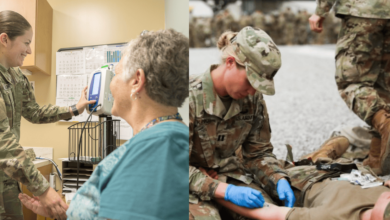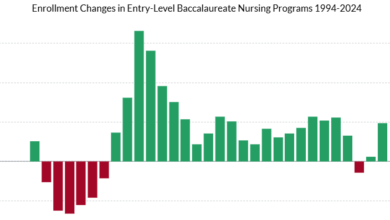Call for ‘protected’ money for GPN retention programmes

Primary care nurse leaders have called for “protected” money for the education and development of general practice nurses (GPNs), amid concerns that recent funding cuts could threaten recruitment and retention of the profession.
It comes as NHS England announced earlier this month that national funding for the General Practice Fellowship programme, and associated schemes, would stop after 31 March 2024.
The fellowship scheme, which was a national commitment announced in the NHS Long Term Plan, offered a two-year programme of learning and development to all nurses new to general practice.
It was designed to support retention of GPNs by offering participants funded continuing professional development opportunities, as well as rotational placements across primary care networks.
However, following NHS England’s changes, any future funding decisions for the programme will now be down to the discretion of regional integrated care boards (ICBs) instead.
Heather Randle, the Royal College of Nursing’s professional lead for primary care and head of education, told Nursing Times that she felt the announcement had been “sprung” on primary care leaders, and that many had raised concerns about the decision.
She said: “By changing the way that that funding is being provided, [it] completely changes the way that the resource will be accessible to nurses, which is the bit that I’m most worried about.
“It’s probably one of the only recognised funding sources that we’ve got for practice nurses at the minute.
“But then to put it into the ICBs, it disappears from a central fund into a devolved fund, and where are the controls in that?”
Ms Randle explained that the national funding had ensured that the GPN fellowship had “ringfenced money” but under the changes this money would “disappear into a pot”.
She said primary care leaders would like to see all ICBs make sure that money was “protected for the fellowships” in general practice, and that a certain percentage was allocated specifically to GPNs.
This is because how much an organisation might commit to GPN training going forward could “depend on how loud the voice of nursing is” in the ICB, argued Ms Randle.
She said: “We need to be making sure that we have nursing leadership at the forefront of general practice.
“If you’ve got a nurse in an ICB who has the ability to speak on behalf of nurses, then we will see things change.”
Ms Randle warned that there was an “ageing workforce in general practice” and that the profession was struggling to recruit younger nurses.
“We’re not seeing the flow of newly registered nurses into the profession, so I think that this is just going to make it worse,” she said.

Heather Randle
In some cases, the GPN fellowships had created “the foundation” for nurses staying in general practice “for the rest of their career”, noted Ms Randle.
“If that isn’t available, then I don’t know what will happen to practice nursing, if I’m brutally honest,” she added.
Ms Randle argued that many practice nurses were already feeling “undervalued” and that this decision from NHS England would not alleviate that feeling.
She added: “It’s just demoralising because they do such a fantastic job, and they’re so skilled in what they do.
“We literally just started to get people really interested in the fellowships…and now they’re going to stop the way it’s funded.
“They aren’t valuing us.”
An NHS England spokesperson said: “These particular national retention schemes were due to end on 31 March 2024, as referenced in policy guidance, however NHS England is committed to future continued investment in retention of staff in general practice.
“ICBs will take on greater autonomy to make decisions that serve the best interests of local people and communities.
“This means that while the general practice fellowships and supporting mentors schemes will no longer operate in their current national form, ICBs will put in place support locally.”






